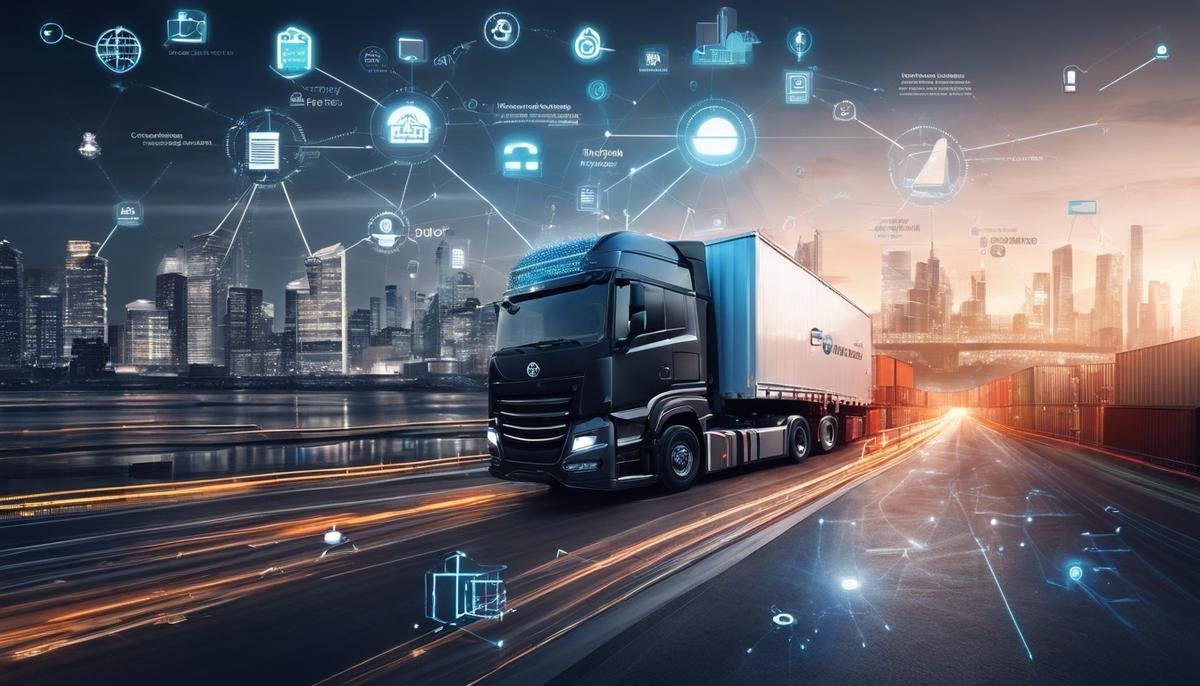The rapid proliferation of Artificial Intelligence (AI) is dramatically altering the logistics sector by providing game-changing solutions to streamline operations and utilize resources efficiently. AI’s potent capabilities in demand forecasting, inventory management, logistics planning, and even warehouse management are transforming the traditional logistics landscapes. These technologies, collectively working on the premise of machine learning, ensure minimum error and significantly enhance accuracy and efficiency. Concurrently, the advent of AI-driven autonomous vehicles together with their route optimization features and predictive tracking capabilities have infused remarkable efficiency in transport and delivery systems. However, amidst the ocean of opportunities that AI offers, it also stirs significant ethical and data security concerns which we must scrutinize in parallel.
AI in Supply Chain Optimization
In the cosmos of unprecedented technological evolution, resides an unraveled mystery of Artificial Intelligence (AI). The impressive power of AI is significantly enhancing various industries, with the supply chain being one of the salient beneficiaries. The transformation is so profound, that one might even draw parallels with the Industrial Revolution in terms of the resoundingly positive impact on performance, efficiency, and effectiveness.
Around the globe, corporations continually grapple with complexities of supply chain optimization, with heaps of data pivoting around multiple parameters—manufacturing, storage, transportation, customer service, and procurement. Here, the power of AI comes into play, transcending traditional computational capabilities and taking supply chain processes to a new echelon.
The role of AI in demand forecasting is revolutionizing the supply chain sector. Through complex algorithms and machine learning (ML), the prediction of inventory demand has become more accurate, steadily driving down overstocking and stock-out scenarios. Furthermore, AI aids in the detection of patterns and trends, with predictive analytics surgically pointing out market changes, seasonal demands, and customer purchasing behaviors.
From the perspectives of warehouse management and logistics, AI-powered robots and automated guided vehicles (AGVs) are optimizing operations, reducing heavy reliance on human labor and minimizing the risk of errors. In essence, they are altering the very functioning of warehouses by efficiently managing high volumes of stock and ensuring swift order fulfillment.
In vendor selection and procurement, AI is significantly valuable. It can evaluate a plethora of vendor attributes, making procurement efficient, transparent, and devoid of human biases. Simultaneously, AI is recognizing potential issues in the supply chain, like vendor delays, and initiating corrective measures, thus ensuring smooth flow in the operations.
Furthermore, AI facilitates process automation in supply chain management, executing various mundane tasks like data collection, invoice processing, or order updating with precision. This elucidates more human resources to focus on strategic tasks, thereby enhancing overall operational efficiency.
On the customer service front, AI is crafting delightful experiences by providing personalized assistance through chatbots or virtual assistants. Thus, meeting customer inquiries and complaints 24/7 helps in achieving higher customer satisfaction.
Incorporating AI in the supply chain also transcends the traditional boundaries of cost-cutting. Through visibility, proactivity, and efficiency, AI-insinuated savings are emerging in asset utilization, energy consumption, and the entire spectrum of the supply chain.
In conclusion, AI is transforming supply chain optimization through forecasting, warehouse management, procurement, process automation, and customer service. The metamorphosis is so much comprehensive that it doesn’t just represent an incremental improvement but rather a paradigm shift in how supply chains operate and deliver value. As the AI-bolstered journey continues, the supply chain landscape is destined to pivot on the axles of efficiency and innovation.

AI-enhanced Warehouse Operations
Title: A Deeper Dive into AI’s Utility in Warehouse Operations
Having navigated through the multifaceted influence of artificial intelligence (AI) on supply chain optimization, one could efficiently appraise how this ground-breaking technology streamlines various processes in this domain. The target of our consideration presently is the enhancements AI has rendered to warehouse operations, where its infusion has led to significant efficiencies, transcending traditional paradigms.
One crucial facet of a warehouse system that has been vastly improved through contemporary AI utilization pertains to warehouse design. Conventional human-rendered designs often overlook intricate constraints and potential inefficiencies, despite extensive expertise. In contrast, AI can generate a comprehensive warehouse blueprint by heeding these constraints and optimizing for efficiency through an elaborate analysis of data including product types, quantities, sizes and more.
Predictive analysis is another tenet of AI’s application within the warehouse operation realm. With the aid of machine learning algorithms, AI can forecast potential issues within the warehouse, such as equipment failure or goods with high damage susceptibility. By proactively identifying these risks and rectifying them beforehand, the elevation of operational efficiency and reduction of wastage is made possible.
Also noteworthy is AI’s pivotal role in labor management within warehouse operations. By analyzing historical employee performance and business ‘ebbs and flows,’ AI can make intelligent recommendations, such as optimal shift schedules designed to maximize output while minimizing cost. The diminution of managerial burden associated with labor allocation is made feasible, thus improving workflow organization.
To further underscore AI’s contribution to warehouse efficiency, look no further than its involvement in enhancing transport systems within the warehouse setting. Whether via today’s evolving Unmanned Aerial Vehicles (UAVs) for aerial transport or the Automated Guided Vehicles (AGVs) on the ground, AI-powered transport systems have revolutionized speed, precision, and safety within warehouse environments.
Lastly, the impact of AI in stock-level optimization cannot be unstated. AI systems robustly analyze the harmonious dance of supply and demand, fashioning an accurate depiction of necessary stock levels. Clearance of stocks nearing expiry and the timely placement of new orders have drastically diminished costs in terms of storage and wastage.
The undeniable vitality of AI in warehouse operations marks another intriguing chapter in the story of AI’s transformational influence within supply chain management. As AI persistently carves its niche in an assortment of fields, its application within warehouse operations is a testament to its capacity and potential in achieving optimum efficiency and performance.

AI in Logistics – Transport and Delivery
Heading into the specific realm of transportation and delivery, artificial intelligence paves the way for numerous advancements.
These strides forward help to effectively manage complex system dynamics, increase optimization, and reduce risks associated with human error.
Automated transport systems, augmented by artificial intelligence, contribute greatly to enhancing speed, precision, and safety.
Various AI technologies like IoT, machine learning, and computer vision combine to facilitate automation in the operations of self-driving trucks, drones, and other unmanned vehicles.
This results in optimized routes, fewer delays, and improved delivery speeds.
Further, the reduction in human input also sharply reduces the probability of accidents caused by human fatigue or miscalculations.
In addition, AI enables predictive analysis, representing a significant tool in identifying potential issues within transport and logistics before they morph into substantial problems.
By using big data analytics, AI can forecast possible breakdowns in trucks or ships, discrepancies in delivery routes, or potential weather disruptions.
By detecting these issues in advance, companies can enact preventive maintenance of vehicles, redesign delivery routes, or adjust schedules, thereby ensuring flawless operations.
Moreover, the implementation of AI brings about notable improvements in labor management.
Specifically, it optimizes scheduling of shifts and reduces redundant labor costs.
An AI-driven system can examine a vast range of variables, such as load weights, delivery routes, and time windows for deliveries, to produce the most efficient work schedules.
This dynamic allocation of human resources not only saves on labor costs but also enhances operational efficiency.
In the bigger picture, AI assists in optimizing warehouse design itself.
By analyzing patterns in storage usage and the frequency and speed of item retrieval, AI can suggest alterations to warehouse layouts.
This can make the storage and retrieval process more efficient, thereby saving time and reducing associated operational costs.
Finally, the impact of AI on stock-level optimization further strengthens efficiency in the logistics sector.
AI algorithms can accurately predict stock demand using data from diverse sources, thereby enabling companies to maintain optimal stock levels.
The resultant reducing in overstocking or understocking scenarios consequently curtails storage and wastage costs.
In essence, the manifestation of AI in transportation and delivery streamlines operations and amplifies overall performance.
Simultaneously, it diminishes costs and boosts efficiency.
Through these numerous benefits, artificial intelligence continues to revolutionize the logistics industry, hinting at an era of unprecedented efficiency and effectiveness.

Ethical Considerations and Data Security
The Ethical Considerations and Data Security Implications of AI in Logistics
Following the exploration of the various facets in which artificial intelligence (AI) plays a pivotal role in restructuring and optimizing the logistics domain, it is noteworthy to delve into the ethical dimensions, as well as data security concerns pertaining to the utilization of AI in this arena.
Within the sphere of AI ethics, questions emerge about accountability, transparency, privacy, and fairness. These considerations are not merely philosophical or theoretical, but have genuine, practical implications within the logistics sector. As AI has the potential to make independent decisions – decisions which can potentially affect human lives and livelihoods – determining who holds responsibility for these AI-driven actions becomes paramount. With AI permeating into vendor selection, procurement, demand forecasting, and inventory management, this technology is leaving an indelible footprint on the realm of logistics. Consequently, the transparency of these AI systems in making decisions which majorly impact the supply chain mechanism is of utmost importance.
Further, AI’s access to vast amounts of data, coupled with its machine learning (ML) capability to recognize patterns and draw insights, raises serious concerns about privacy and fairness. For example, while AI can undoubtedly aid in labor management and shift scheduling, the question arises whether this intelligence could inadvertently and unjustifiably discriminate. Algorithms could conceivably make decisions based on factors like age, gender, or ethnicity which are unacceptable in fair work practices. Therefore, the stringent oversight of fairness principles in AI development and deployment within logistics is of vital importance.
The discussion on AI ethics thus extends naturally into the crucial field of data security. With the burgeoning dependence on AI systems across the supply chain management, there is a corresponding surge in the volume of data at risk for potential security breaches. From automated warehouse operations to IoT-based transport systems, AI algorithms incessantly feed on industrial data to optimize the various logistical processes. Secure data storage, transmission, and handling are of utmost importance, as failure to ensure this can lead to catastrophic consequences – misleading AI-driven forecasts, compromised business decisions, and erosion of customer trust. These concerns accentuate the necessity for robust cybersecurity measures incorporated into AI frameworks.
Moreover, as AI ventures deeper into customer service through chatbots and virtual assistants, the risk of personal customer data compromise poses an immediate concern. Ensuring the prevention of unauthorized access, modification, or destruction of this data is critical for both maintaining customer trust and adhering to data protection laws.
It is undeniable that while AI holds the promise of transforming logistics, responsible usage is necessary – a balance where the technology’s benefits are harnessed to their full potential while addressing and mitigating the ethical and data security challenges it inevitably brings. The harmonious blend of these two aspects will pave the way for a positively transformative AI-enabled future in the logistics realm.

Artificial Intelligence, undoubtedly, offers a multitude of exciting avenues for improving processes in the logistics industry. Its ability to optimize supply chains, enhance warehouse operations and significantly boost transport and delivery systems is revolutionary. Nevertheless, it is equally critical to wrestle with the ethical challenges posed by automation and data security issues that the increasing reliance on AI brings. Integrating AI into our systems requires navigating these complex considerations with care and foresight to responsibly harness AI’s groundbreaking potential in shaping the future of logistics.




